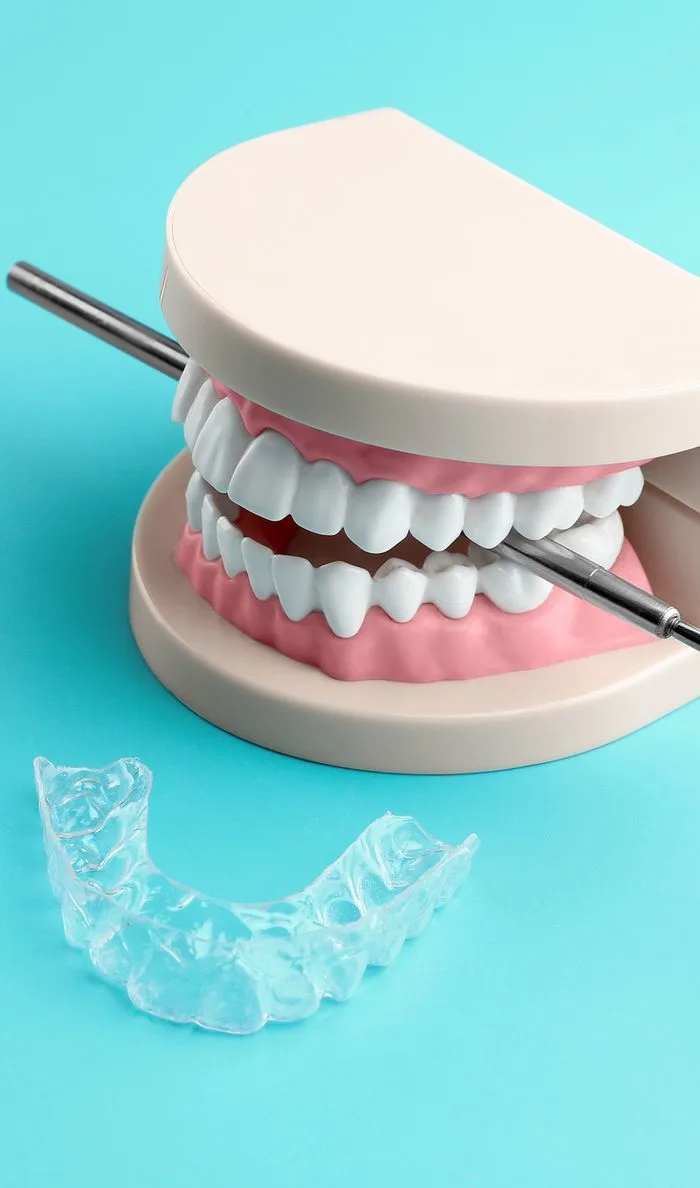
TMJ/TMD Treatment in North Raleigh, NC
Jaw clicking, soreness, or tension can compromise your comfort and keep you from chewing with natural ease. This pain often stems from TMJ/TMD, a jaw disorder that can be resolved with a variety of minimally invasive, tailored treatments. Find relief with solutions from your dentist today.
Why Should I Get TMJ/TMD Treatment?
TMJ/TMD treatment is the best way to restore your oral range of motion, eliminate your pain, and get you back to your day-to-day routine. The pain and discomfort of TMJ/TMD can be extreme, and it can stop you from eating your favorite foods, chewing normally, or even speaking without pain and discomfort. Jaw issues like TMJ/TMD won’t get better on their own, and may even get worse over time. If you’re having jaw pain, that’s not normal. Contact us for a consultation right away. We’ll get to the bottom of the problem, give you a diagnosis, and provide the care you need for a healthy, functional, pain-free jaw.

.webp)
Stress-Free Care For You
We’re committed to making care affordable and accessible. That's why we offer complimentary consultations for patients suffering from TMJ/TMD, so you can move forward with treatment with confidence.
Discuss your issues
Get an expert opinion
Learn about treatment plan options
The Benefits of TMJ/TMD Treatment
Relieve Your Pain And Discomfort
TMJ/TMD causes serious, chronic jaw pain that can interfere with your ability to work, focus on school, and live your day-to-day life. With proper treatment at our office, you can get your life back to normal.
Restore Oral Range Of Motion
TMJ/TMD can make your jaw “lock” or stiffen. This makes it hard to open and close your mouth properly, which could interfere with biting, eating, and even speaking. Treating TMJ/TMD restores your oral range of motion.
Treat Other Related Problems
TMJ/TMD is related to lots of other problems including tinnitus (ringing of the ears), teeth grinding, chronic headaches, neck and upper back stiffness, and more. With proper treatment from a qualified dentist, you can get relief from a variety of symptoms that may be related to TMJ/TMD.
The TMJ/TMD Treatment Process
Initial Consultation & Diagnosis
TMJ/TMD can be caused by lots of different things, from jaw overuse (like excessive gum chewing or teeth grinding) to direct trauma to the joint, and even some auto-immune problems like arthritis in the joint. So the first step is to come to our office for an appointment. Your doctor will perform a comprehensive oral exam, discuss your symptoms, and determine what’s causing your TMJ/TMD.
Developing Your Treatment Plan
Once your dentist has determined the potential causes of your issue, they will work with you to develop a custom treatment plan. This could include things like oral appliance therapy (OAT) to adjust the position of your jaw during sleep, and even things like orthodontic treatment with braces or Invisalign.
Lifestyle Changes & Physical Therapy
Along with TMJ/TMD treatment from your dentist, certain lifestyle changes and at-home physical therapy can help improve your oral range of motion and the symptoms of TMJ/TMD. For example, you can choose to eat softer foods for several weeks to help your jaw heal, or you may need to do some jaw exercises to help with your recovery. Your dentist will discuss these topics with you in detail as they develop your treatment plan.
FaQ's
Frequently Asked Questions
Check out these frequently asked questions, or call us to speak with our team.
The symptoms of TMD vary quite a bit depending on the patient. You may experience issues like:
If you notice any of these symptoms, we recommend scheduling an appointment with your dentist right away to get help.
TMD and TMJ pain is caused by a variety of different issues:
Because TMD and TMJ pain can be caused by so many different health issues, it’s important to see an experienced dentist when seeking care.
Some cases of mild TMD may go away on their own with lifestyle changes, such as ceasing gum chewing, de-stressing to eliminate teeth clenching, and more. However, if you suffer from the symptoms of TMD for more than a week or two, your condition may be chronic. To learn more about your specific case of TMD, it’s best to seek a qualified, experienced dentist to get the help you need.
Applying a hot compress to the area at 10-minute intervals can help with inflammation and control the pain and discomfort of TMD as your jaw heals.
It’s also a good idea to take steps to decrease jaw clenching, such as exercising and de-stressing to reduce the likelihood of nighttime teeth grinding. You may also want to consider ceasing gum chewing, and eating a diet of mostly soft foods to minimize the work your jaw muscles must do while they heal.
You can also use over-the-counter medicines like ibuprofen to help control pain and inflammation as your jaw heals, and you recover from TMD.
While some cases of TMD are minor and can be resolved with these simple steps and other at-home remedies, you should consider seeking help if you experience serious pain and discomfort, or if your symptoms persist for 1-2 weeks or longer.



